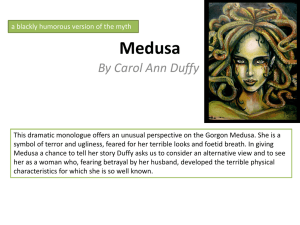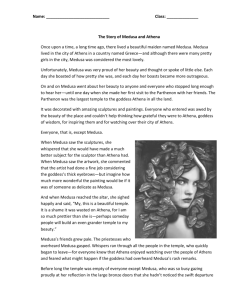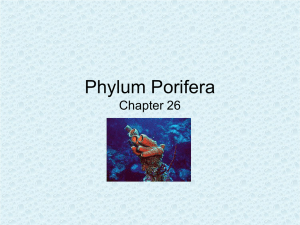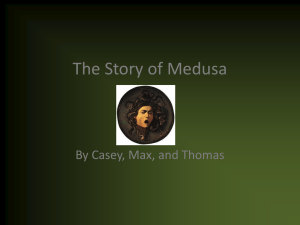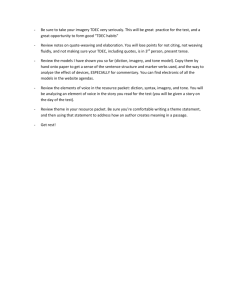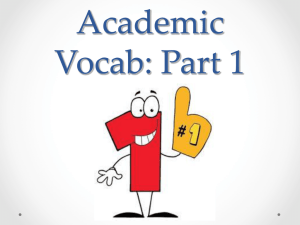Sample poetry comparison analysis
advertisement
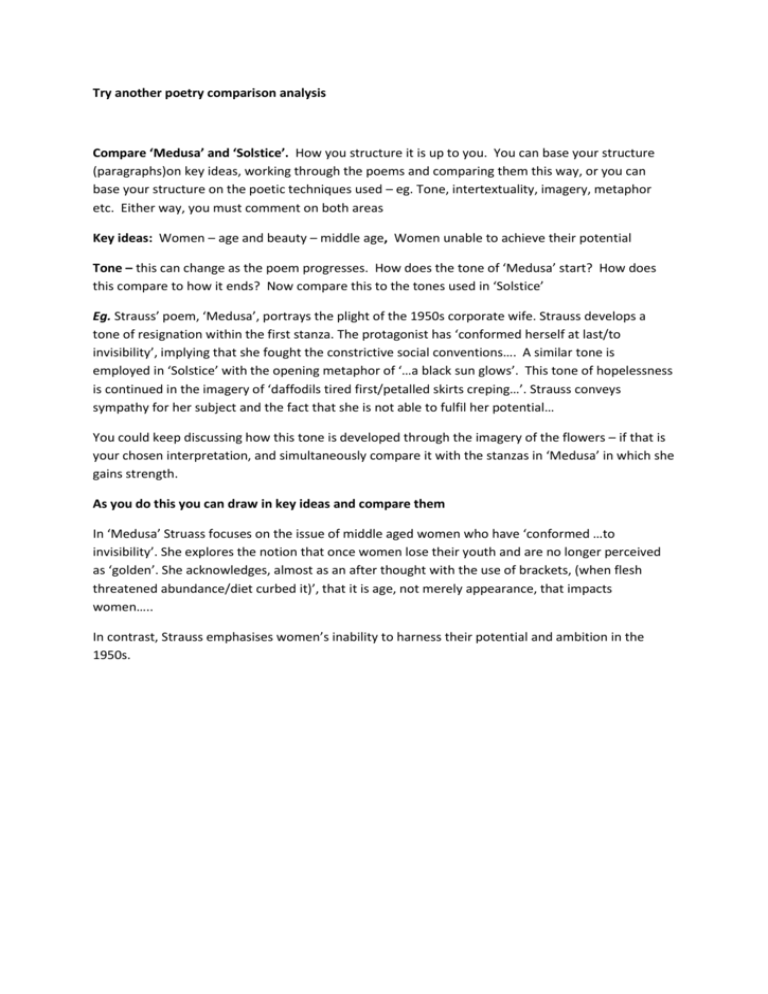
Try another poetry comparison analysis Compare ‘Medusa’ and ‘Solstice’. How you structure it is up to you. You can base your structure (paragraphs)on key ideas, working through the poems and comparing them this way, or you can base your structure on the poetic techniques used – eg. Tone, intertextuality, imagery, metaphor etc. Either way, you must comment on both areas Key ideas: Women – age and beauty – middle age, Women unable to achieve their potential Tone – this can change as the poem progresses. How does the tone of ‘Medusa’ start? How does this compare to how it ends? Now compare this to the tones used in ‘Solstice’ Eg. Strauss’ poem, ‘Medusa’, portrays the plight of the 1950s corporate wife. Strauss develops a tone of resignation within the first stanza. The protagonist has ‘conformed herself at last/to invisibility’, implying that she fought the constrictive social conventions…. A similar tone is employed in ‘Solstice’ with the opening metaphor of ‘…a black sun glows’. This tone of hopelessness is continued in the imagery of ‘daffodils tired first/petalled skirts creping…’. Strauss conveys sympathy for her subject and the fact that she is not able to fulfil her potential… You could keep discussing how this tone is developed through the imagery of the flowers – if that is your chosen interpretation, and simultaneously compare it with the stanzas in ‘Medusa’ in which she gains strength. As you do this you can draw in key ideas and compare them In ‘Medusa’ Struass focuses on the issue of middle aged women who have ‘conformed …to invisibility’. She explores the notion that once women lose their youth and are no longer perceived as ‘golden’. She acknowledges, almost as an after thought with the use of brackets, (when flesh threatened abundance/diet curbed it)’, that it is age, not merely appearance, that impacts women….. In contrast, Strauss emphasises women’s inability to harness their potential and ambition in the 1950s. Sample Passage analysis – ‘Medusa and Solstice’ Jennifer Strauss’ poem, ‘Medusa’, portrays the plight of the 1950s ‘corporate wife’. Strauss develops a tone of resignation within the first stanza. The protagonist has ‘conformed herself at last/to invisibility’, implying that she fought the constrictive social conventions for some time. A similar tone is employed in ‘Solstice’ with the opening metaphor of ‘…a black sun glows’. This tone of hopelessness is continued in the imagery of ‘daffodils tired first/petalled skirts creping…’. Within both poems, Strauss gives a voice to women of the 1950s. In ‘ Medusa’, the ‘corporate wife’ lacks an identity, yet represents, and gives voice, to many of the women of the era. In the first two stanzas we can see that the protagonist was vibrant and sensual with ‘wild hair that once streamed/down to her waist’, yet now she experiences ‘licensed extravagance’. Strauss is conveying the plight of the ‘woman of middle age’ as they are forced to act in a certain manner. This tone of resignation is continued in the second poem, ‘Solstice’, as the speaker observes the subject, ‘Crossing your hands, disciplined upon your lap’. Through both poems, Struass explores the notion of expected and accepted social behaviours. In ‘Medusa’ Struass focuses on the issue of middle aged women who have ‘conformed …to invisibility’. She explores the notion that once women lose their youth and are no longer perceived as ‘golden’, compared to the young ‘glittering prize of the executive suite’. She acknowledges, almost as an afterthought with the use of brackets, (when flesh threatened abundance/diet curbed it)’, that it is age, not merely appearance, that impacts women in society. The young are seen as ‘golden’ and hence more valuable. This is contrasted in ‘Solstice’ in which the key concern is the difficulty women had in achieving their potential. The title itself implies despair and hope, as the Solsticeis the shortest day, with the hope of Spring and longer hours of light to follow. This natural imagery is continued through the feminine imagery of the daffodils, and it is here that the reader can see a change in tone. ‘The daffodils tired first’, suggestive of those who quickly succumb to social conventions. However, ‘the stiff tulips’ can be seen as a metaphor of those who fought against the constrictiveness of society by ‘Spreading their petals/Showed the improbable/Blaze at their heart’. The line structure and capitalisation is significant here as the impossibility of their plight is emphasised through the word ‘improbable’, yet we can perceive their potential , passion and frustration through the capitalisation of ‘Blaze’ and it’s connotations of fire. This loss of potential is highlighted in the third stanza. Again symbolism is used within the imagery of the petals to convey loss of hope, ambition and potential, ‘The unwithered petals/Fell to a touch…/Of fire bird plumage/Tipped with black’. The change of layout of this stanza, as the indentation is narrowed, symbolises the narrowing of choices in her life. In the second stanza of ‘Medusa’ the subject continues to appear submissive. Her husband is attempting to ‘reclaim ecstasy’ in ‘middle life’. Strauss’ use of personification is significant. He ‘gorges on his passion’, implying his emotional greediness and selfishness. As he ‘almost forgets/the expense of divorce’ the reader is positioned to see the husband as irrational in his desire to reclaim youth. In contrast his wife ‘starves her rage, practises/worldly wisdom’. The rhyme and rhythm of the description of the husband conveys a quickened, frantic pace, whereas the alliteration of ‘worldly wisdom’ develops a gentle rhythm, indication her thoughts and actions are carefully considered. While the subject in ‘Solstice’ appears to give up hope, there is a change of tone in ‘Medusa’ by the third stanza. Strauss utilises assonance to again quicken the pace, ‘obscure distress, pressure in the chest…he fumbles, stumbles’. As the panic of the husband is evident, and he perceives his weakness due to middle age, the incorporation of the strong women of Greek mythology, Helen and Medusa, foreshadow the strength that is to come to the ‘invisible wife’. As he is realising his age through the dismissal of the ‘golden prize’ by a ‘flicker in those limpid youthful eyes’, the reader can see that the gender roles have been subverted, as it was (a look that Helen might have turned/on Paris once he he’d grown uxorious). Through the speaker’s use of brackets, we can assume that they are only just coming to the realisation also that females are not at the mercy of males. As her ‘unbound hair tousles round her pale shoulders’, her sensuality is restored and the link to ‘Medusa’ is confirmed. As she allows him to ‘contract to stone’, the story of Medusa is converted. He realises that he has caused her ‘unconcern’ and his actions are the reason that his ‘heart, limbs, tongue/contracted to stone/he falls …through the blackness of her gaze.’ It is not her ugliness that turns him to stone, but her new found strength. While a degree of blame is placed on the husband in ‘Medusa’, the speaker reminds the subject in ‘Solstice’ that ‘It’s not…really that he’s so awful’ but that ‘life could be different’. Strauss is conveying that the male is also subject to the expectations and constraints of society, and is not to blame. However, by repeating the first line, she emphasises the impact of these constraints on women.
